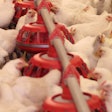
The cost of eggs in the U.S. has led to more people attempting to bring shell eggs across the U.S.-Mexico border.
There has been a 29% increase in confiscation of shell eggs at ports of entry on the border between October 2024 and February 2025, compared to the same time last year, according to U.S. Customs and Border Protection (CBP).
Consumers are prohibited from bringing raw eggs across the border due to concerns of diseases such as highly pathogenic avian influenza (HPAI).
CBP Director of Field Operations Sidney Aki posted about the incidence on social media platform X, stating: “The San Diego Field Office has recently noticed an increase in the number of eggs intercepted at our ports of entry. As a reminder, uncooked eggs are prohibited entry from Mexico into the U.S. Failure to declare agriculture items can result in penalties of up to $10,000.”
Even though its common to bring some groceries across the border, explained Smart Border Coalition Executive Director Joaquin Luken in a statement to news outlet NBC San Diego, there have been more attempts to bring shell eggs than ever, and that they are still prohibited no matter if there is a shortage or not.
Outbreaks of HPAI in the U.S have caused the depopulation of over 126 million commercial layers and pullets since February 2022, according to the U.S. Department of Agriculture (USDA) Animal and Plant Health Inspection System (APHIS). These fluctuations in layer numbers have caused egg prices to increase significantly due to shortages across the country.
Countries have committed to exporting eggs to the U.S.
Due to the egg shortages being seen in the U.S., the Republic of Turkey has committed to shipping eggs over the next six months. Between February 2025 and July 2025, the country said it will export approximately 15,000 metric tons of eggs to the U.S.
According to Egg Producers Central Union chairman Ibrahim Afyon, the exports will take place through its member companies while two firms will coordinate the process.
View our continuing coverage of the global avian influenza situation.



















